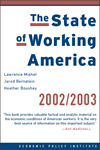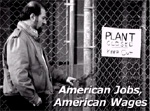International President
Secretary Treasurer
GVP Western
GVP Midwest
GVP Headquarters
GVP Eastern
GVP Transportation
|
Tuesday,
September 3, 2002 “The IAM is going the extra mile, here. We asked Boeing last week, in the presence of the federal mediator, to continue negotiations and to extend the contract past Sept. 2, but Boeing refused. Well, at least the FMCS was listening. They asked Boeing and the IAM to Washington to do exactly that – extend the contract and continue bargaining to avert a strike,” said IAM Chief Negotiator Dick Schneider. “We believe Boeing is trying to incite a strike. We say that based on Boeing’s demands for deep takeaways in job security and health care and the blatant scare tactics they’ve used at the bargaining table and against our members and the public,” Schneider said. “Boeing might save money by forcing a strike. We’d rather stay on the job building airplanes. That keeps $27 million a week in wages flowing to our members and through the local economies where we live,” Schneider said.
EPI Report: Grim News for Workers However, rising unemployment and stagnant job growth bodes ill for workers. “American workers are headed back to an economy marred by slow wage growth and no job growth, with wage and income disparities widening again,” said Lawrence Mishel, EPI president and one of the book’s authors. Despite all the attention focused on the stock market, the vast majority of American families still depend on their paycheck, not their portfolio,” pointed out co-author Heather Boushey. “For most families, the real prosperity of the second half of the 90s had little or nothing to do with the stock market.” Although about half of all households now hold some stock—either directly or through retirement plans---these holdings only amount to about $4,000 for the bottom 60 percent of families. By contrast, the top 1 percent of families holds almost half, 47 percent, of all stocks by value. The bottom 80 percent owns barely 4 percent of total stocks. For more details, log onto www.economicpolicyinstitute.org.
Union Leaders at
UAL to Meet The union summit comes two days after the UAL Corp. board of directors unanimously approved the appointment of former Texaco president Glenn Tilton to become the airline’s next president, chairman and chief executive officer. Additional management changes at the airline include the immediate resignation of UAL president Rono Dutta and Chief Operating Officer Andy Studdert. United’s previous management last met with union representatives on August 28 to outline the company’s financial condition and to present so-called ‘recovery proposals’ they said were necessary to avoid bankruptcy and to secure government loan guarantees.
Congress Returns to
Full Agenda Most political observers see a lot of rhetoric but not much action as both parties try to seize the initiative and tip the political balance in their favor. President Bush and his party have tried to muddy the waters on such issues as Social Security, a prescription drug benefit and similar social issues. Democrats believe the slumping economy makes the President’s party vulnerable and are turning up the heat in that area. House Minority Leader Dick Gephardt, D-MO, reminds voters that “the drug companies wrote the bill” on prescription drugs that narrowly passed the House. “It was a total capitulation to special interests,” he charged. Gephardt and other Democrats believe economic anxiety will bring voters to their party on a host of issues ranging from healthcare to the environment. It promises to be an interesting session as Congress positions itself for the November 5 vote.
Union Ratings Rise
in New Poll More than 39 percent of those surveyed held negative views of large corporations, up from 25 percent last year. That’s the highest negative ratings for corporations in the nine years pollsters have asked the public for their views. More than 58 percent have negative views about CEOs, who’ve raked in fortunes while their corporations toppled into bankruptcy. By contrast, for the first time since 1984, fully half of workers who don’t already have a union say they would join a union tomorrow if given the chance. That figure is up from 42 percent just last year. |
|






